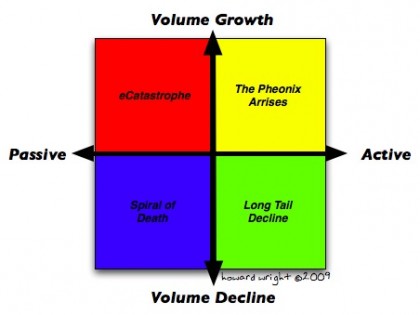
The future of mail
I was listening to a debate recently on BBC Radio 4 between the CWU and Royal Mail about the strike action that has been taking place over the last few weeks in the UK.
There seemed to be some fundamental misunderstandings, as both parties seemed to be saying the same thing but clearly hearing something different.
I guess the question comes down to ‘What is the future of the mailing industry in the UK?’ – does it have one or are all communications going to drift to electronic ones over the coming years? I have over the last 20 years spent a lot of time thinking about this topic and have written many papers on the subject, internally for Royal Mail, as a consultant and more recently for Pitney Bowes in the US.
The postal industry as a whole seemed to lose its way in the 1990s when it started to focus on volume rather on the value that people placed on the letters/messages sent and received. With the threat of the Internet and SMS, and the declining volumes of mail that are now being blamed on this new media, the battle lines are now drawn – the unions want to protect their members’ jobs and Royal Mail need to maintain profitability in a declining market.
Both these needs could be served if volumes of letters remained the same and the senders and recievers placed value on the correspondence. Unfortunately because of the strategy of maintaining volume at all costs the quality of the things we get through the mail has declined and with it the value we place on the letterbox as a communication channel.
So back to the future of the mail. As a futurist there are many scenarios that play out, however for the purposes of this blog I present four scenarios that could play out:

Future of Mail Scearios
1. Spiral of death – in this scenario volumes continue to decline, labour problems persist and technology provides ways of presenting information in ways that users find an acceptable alternative to paper (ePaper and eInk). This seems to be where we are heading at the momemt and in this scenario delivery of letters six days per week has less than five years to survive in its current form
2. The Long Tail decline– volumes of letters stabilise and there is a general agreement about the future of the indutry between the unions and Royal Mail. In this scenario the industry is still in decline but the length of the decline is five to 10 years, the frequency of delivery is reduced to two to three days per week and the value of the items delivered is seen by the sender and receiver. An overall reduction in mail volumes means that the mail that we do get is of higher value.
3. The Phoenix arises – this scenario is predicated on a loss of interest in all things digital – the human race as a species in inherently analogue in nature and there is a re-awakening to value of the written word. The Slow Words movement becomes a worldwide phenomena and the art of writing is resurrected in schools and the workplace.
4. eCatastrophe – This is a scenario that has been discussed many times in many forums but there is little understanding as to the true consequences of the outcomes. The scenario goes that there is a massive solar flare that wipes out vast swathes of our electronic infrastructure – we return to a dependence on the mail as our primary communication channel although even that has to be ‘re-invented’ as the postal system has placed an increasing reliance on technology for its day to day operation.
OK, I realise that there are probably 20 other scenarios that could be written about the future of the postal system but for me one thing stands out in these four as a common theme and that is the return to an appreciation of the value of the things that come through our letterbox on a daily basis. This, I feel, should be a fundamental driver for the postal industry – moving from volume to value.
How do you think the industry needs to change? What would your scenarios be?













